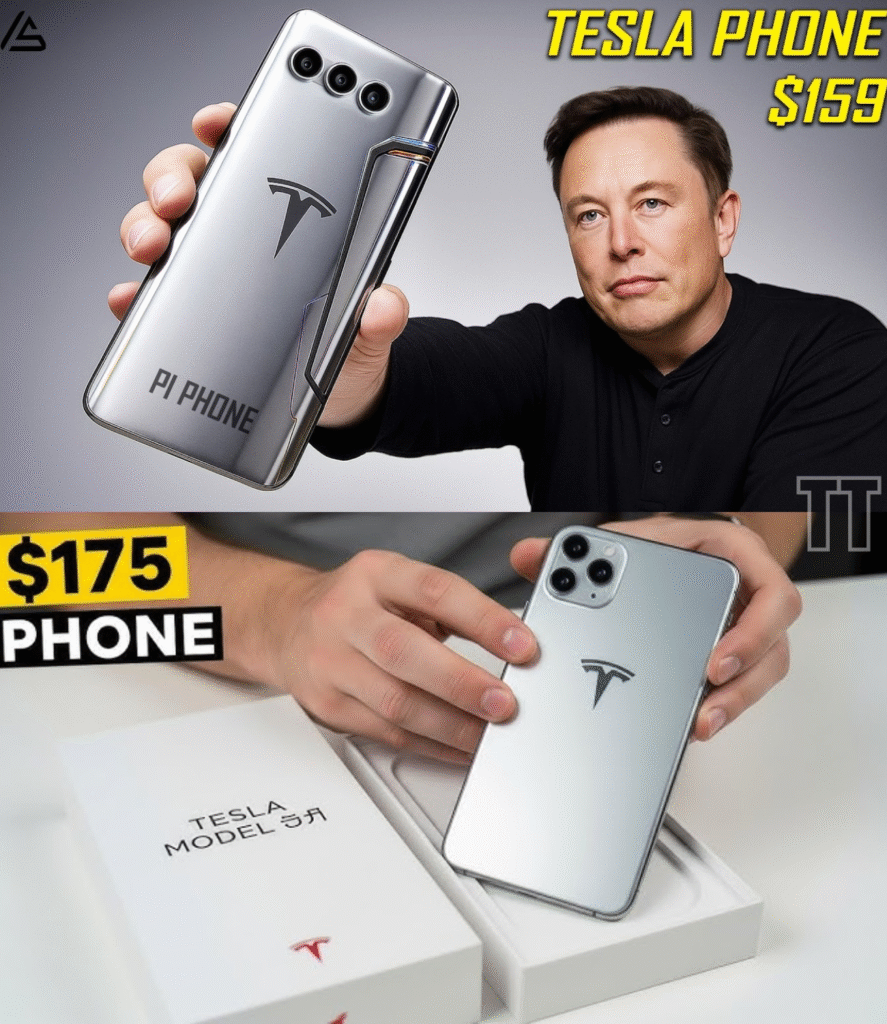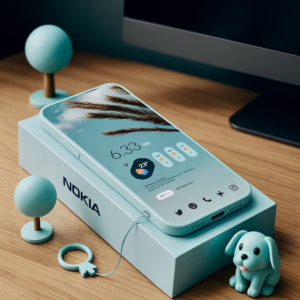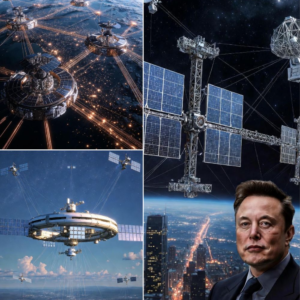
The $159 Miracle That’s Breaking the Internet

When Elon Musk announced that Tesla would officially enter the smartphone market, the tech world went into chaos. But no one — not even his most devoted fans — was ready for what came next. The Tesla Pi Phone 2026, priced at just $159, isn’t just another entry into the smartphone race. It’s a total rewrite of what we thought a phone could do.
From its Starlink-powered internet to solar charging, AI-driven software, and now a shocking hidden feature that’s left the entire industry stunned, this is the moment where technology and science fiction finally meet.
But here’s the real kicker: Elon Musk never mentioned this feature during his live presentation. It wasn’t in the press release. It wasn’t on the official spec sheet. Yet insiders have leaked details so revolutionary that tech forums, investors, and even rival companies are in meltdown mode.
And once you hear what this hidden feature does… you’ll understand why some are calling the Pi Phone 2026 “the end of every other smartphone brand.”
The Hidden Feature No One Saw Coming

The Pi Phone 2026 was already impressive on paper — 7.8-inch foldable display, 12K AI camera, Neuralink-ready architecture, and direct Starlink connectivity. But what’s making headlines now isn’t any of that.
According to multiple leaked internal memos from Tesla’s R&D division in Palo Alto, the Pi Phone 2026 includes something called “Quantum Link Mode” — an experimental communication system that doesn’t rely on cellular networks, Wi-Fi, or even satellites.
Instead, it uses quantum entanglement to send data instantaneously, across any distance, without lag or signal loss.
You read that right — instant communication, anywhere in the universe.
A former Tesla software engineer, speaking anonymously to TechFront Global, said:
“We thought it was science fiction. But when we saw the demo, messages were appearing on the other device before the sending animation even finished. It’s faster than light — literally.”
If true, this would make the Tesla Pi Phone 2026 the first consumer device ever to use quantum communication, a technology so advanced that even governments and research institutions are decades away from mastering it.
Elon’s Silent Experiment
Why didn’t Musk mention it publicly? That’s where things get even stranger.
According to insiders, “Quantum Link Mode” wasn’t supposed to be part of the 2026 consumer release at all. It was meant to be a classified internal test within Tesla’s private tech ecosystem. But due to a software patch error during final production, the code for this feature accidentally shipped inside early batches of the phone.
And now, users who discovered it are posting mind-blowing footage online — showing phones communicating across continents, deep underground, and even during total signal blackouts.
One viral clip on X (formerly Twitter) shows two Pi Phones sending video messages inside an active Faraday cage — something that should make any form of wireless communication impossible. The message still went through instantly.
“It’s like the phones are talking through reality itself,” wrote one astonished user.
Elon Musk has yet to comment directly on the leaks, but yesterday he tweeted one cryptic phrase:
“Information doesn’t travel. It connects.”
The End of Internet As We Know It
If Quantum Link Mode is real, it changes everything — not just for smartphones, but for the entire digital infrastructure of the planet.
Forget towers, cables, satellites, and lag. Quantum communication means true instantaneous connection. It’s 100% secure, impossible to intercept, and requires no external hardware.
Experts say this could destroy the need for telecom companies overnight. Internet providers? Gone. Satellite carriers? Obsolete.
Dr. Miranda Hayes, a physicist at MIT, told Global Science Review:
“If Tesla has truly achieved stable quantum entanglement in a consumer device, it’s not just a breakthrough — it’s the biggest leap since the invention of electricity. This could connect humanity in ways we can’t even comprehend.”
Imagine sending live video to the other side of the world with zero delay, streaming in 16K with no buffering, or calling someone on Mars as easily as calling your mom. That’s not the future — that’s the Pi Phone 2026.
A Hidden Power Source Nobody Expected
But Quantum Link Mode isn’t the only shocker.
Another secret uncovered by teardown experts at iFixit reveals that the Tesla Pi Phone includes a secondary micro-core power cell — one that doesn’t rely on electricity at all.
Instead, it draws power from ambient electromagnetic fields in the environment.
In simpler terms, the Pi Phone can charge itself by absorbing background energy — from the Earth, Wi-Fi signals, even your own body’s bioelectric field.
“You could literally turn off all power in your house, and the Pi Phone would still stay alive,” one tester said.
This aligns perfectly with Tesla’s philosophy of self-sustaining technology — echoing Nikola Tesla’s original dream of free, wireless energy for all.
The Specs That Still Shock the Industry
Even without the hidden features, the Pi Phone 2026 is a beast:
- Display: 7.8-inch NanoFold OLED (240Hz refresh rate)
- Processor: Tesla QuantumX 2 Neural Core
- Memory: 18GB LPDDR6
- Storage: 2TB Ultra SSD
- Camera: 200MP AI Fusion Sensor + 48MP UltraZoom + 12MP Depth Mapping
- Selfie Camera: 60MP Under-Display HoloLens
- Battery: 6,000mAh Graphene Cell + Quantum Auxiliary Core
- Charging: SolarGlass 3.0 + Wireless Over-Air Power
- Connectivity: 6G / Starlink / Quantum Link (Experimental)
- OS: TeslaOS 3.0 with Dojo AI Integration
Performance benchmarks show the Tesla Pi Phone 2026 outperforming every flagship on the market — including the iPhone 16 Pro Max and Samsung Galaxy Z Ultra. It’s not just faster; it’s smarter.
TeslaOS 3.0 — The Living Interface
Tesla’s new operating system, TeslaOS 3.0, is powered by the Dojo supercomputer’s neural architecture. It doesn’t just react to you — it predicts you.
If you say, “I’m tired,” your Pi Phone dims your lights, plays ambient music, and silences notifications.
If you say, “I’m late,” it auto-navigates your car, informs your contacts, and books a new schedule slot.
The more you use it, the more it learns. And thanks to on-device learning powered by DojoLite, none of your data leaves your phone. It’s like having your own personal AI — one that evolves with your personality.
“The phone doesn’t just respond,” Musk said during a tech demo. “It feels alive.”
The Neuralink Connection
It’s no secret that Tesla and Neuralink share technological DNA. The Pi Phone 2026 takes that bond further than ever before.
Users who own a Neuralink-compatible device can link their Pi Phone directly to their brain signals — allowing hands-free control through thought, emotion, or eye movement.
Imagine scrolling through your feed just by thinking, “next.”
Or sending a text by imagining the words.
That’s not sci-fi anymore — it’s real.
Early Neuralink beta testers report that this integration feels “natural, seamless, and even emotional.” One participant described it as “talking to your phone like it’s part of your own mind.”
A Camera That Sees the Invisible
Tesla’s camera system has stunned even professional photographers. Using what Tesla calls NeuraVision X, the Pi Phone 2026 can capture wavelengths beyond visible light — including infrared and ultraviolet.
That means you can take photos in total darkness without flash, see heat signatures, and even detect hidden watermarks or energy traces.
“You can literally see the world in ways humans never could,” one tech reviewer wrote.
It’s like having night vision, a thermal camera, and a DSLR — all in your pocket.
The Internet Can’t Handle It
After the leaks, social media went wild. Within hours, #QuantumPiPhone, #TeslaHiddenFeature, and #ElonShock trended worldwide.
One user posted:
“If this thing really communicates instantly without signal… goodbye Apple, goodbye 5G, goodbye everything.”
Another tweeted:
“$159 for a quantum communicator? Elon Musk just dropped the price of the future.”
Meanwhile, major networks scrambled to verify the claims. CNN, BBC, and Bloomberg requested statements from Tesla — none were returned.
Even The Verge, known for its skepticism, admitted:
“If these reports are real, the Tesla Pi Phone is the most important tech product since the iPhone — and maybe since the internet itself.”
Governments Are Nervous
It’s not just corporations that are worried — governments are too. Quantum communication is impossible to track or intercept, which means messages sent via Pi Phones could be invisible to intelligence agencies.
One cybersecurity expert called it “the CIA’s worst nightmare.”
If everyone used a Pi Phone, global surveillance would effectively die overnight. No more tapping, no more metadata, no more control.
A leaked report from the European Telecommunications Authority even warned that the “proliferation of quantum communication devices” could “destabilize existing security frameworks and monitoring systems.”
In short: Elon Musk just broke the internet — literally.
Beyond the Phone — A Global Ecosystem
The Pi Phone 2026 isn’t a standalone gadget. It’s the centerpiece of a larger Tesla vision — a world where every device connects through energy, AI, and universal communication.
Your Tesla car syncs with your Pi Phone.
Your home solar panels talk to it.
Your Neuralink interface connects seamlessly.
You become part of a living ecosystem — one that learns, adapts, and evolves.
And at just $159, Musk’s message is clear:
“Technology shouldn’t be luxury. It should be freedom.”
Final Thoughts — The Day the Future Arrived
The Tesla Pi Phone 2026 isn’t just another smartphone. It’s the moment when technology crossed a threshold — from tool to companion, from device to dimension.
If the leaks are true, and Quantum Link Mode is indeed functional, then Elon Musk hasn’t just disrupted an industry. He’s rewritten the rules of physics, communication, and human connection.
And he did it all for $159.
The tech world may never be the same. The only question now is: what will Tesla disrupt next?
Because if the Pi Phone 2026 can talk across the universe… maybe Elon Musk is already building the next frontier — one message at a time.




